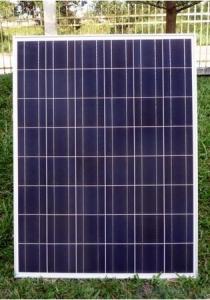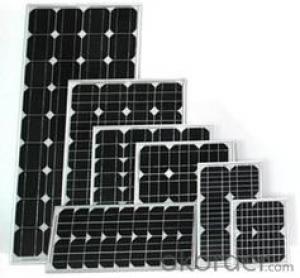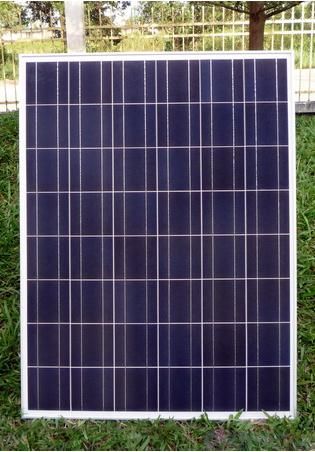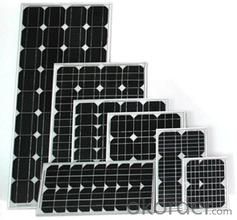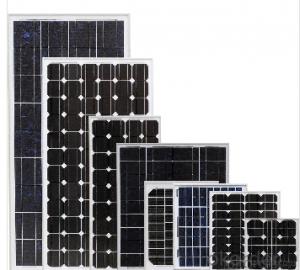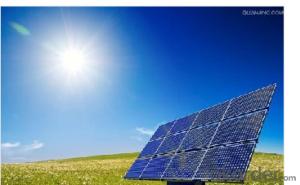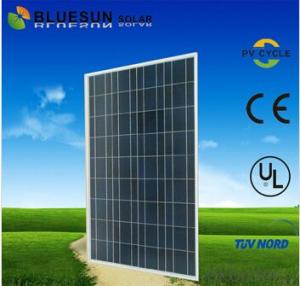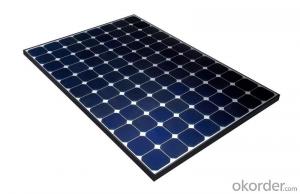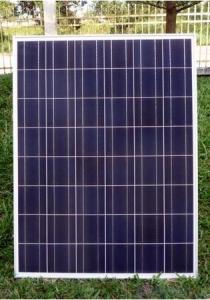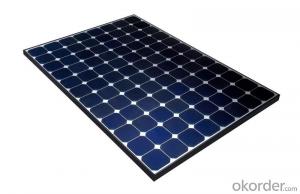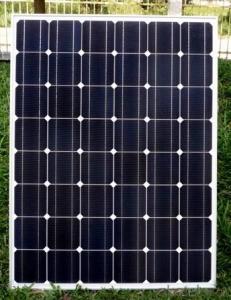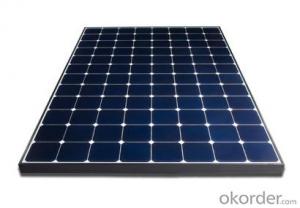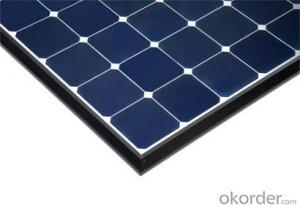Floating Solar Panels - CNBM Poly 240W Solar Panel with TUV UL CE Certificate for Residential
- Loading Port:
- Shanghai
- Payment Terms:
- TT OR LC
- Min Order Qty:
- 100 watt
- Supply Capability:
- 1000 watt/month
OKorder Service Pledge
OKorder Financial Service
You Might Also Like
Specification
CNBM Poly 240W Solar Panel with TUV UL CE Certificate For Residential
Introduction
Electrical connections are made in series to achieve a desired output voltage and/or in parallel to provide a desired current capability. The conducting wires that take the current off the modules may contain silver, copper or other non-magnetic conductive [transition metals]. The cells must be connected electrically to one another and to the rest of the system. Externally, popular terrestrial usage photovoltaic modules use MC3 (older) or MC4 connectors to facilitate easy weatherproof connections to the rest of the system.
Solar modules use light energy (photons) from the sun to generate electricity through the photovoltaic effect. The majority of modules use wafer-based crystalline silicon cells or thin-film cells based on cadmium telluride or silicon. The structural (load carrying) member of a module can either be the top layer or the back layer. Cells must also be protected from mechanical damage and moisture. Most solar modules are rigid, but semi-flexible ones are available, based on thin-film cells.
In contrast, a solar thermal collector supplies heat by absorbing sunlight, for the purpose of either direct heating or indirect electrical power generation from heat. A "photoelectrolytic cell" (photoelectrochemical cell), on the other hand, refers either to a type of photovoltaic cell (like that developed by Edmond Becquerel and modern dye-sensitized solar cells), or to a device that splits water directly into hydrogen and oxygen using only solar illumination.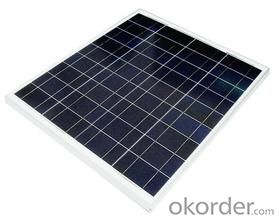
Suggested application
Home lighting business lighting,
Garden lighting, pavement lighting
Farmer household lighting
Decorative water pump
Traffic signal lighting
Industry area
Business area
Solar Power Plant
Product feature
Modules are made of Monocrystalline or Polycrystalline Silicon cell.
Materials and color of the solar panel frame: Clear anodized aluminum alloy type 6063T5 Universal frame; Silver-white color;
The output connection gathers the coupling: Selects conforms to the IEC-612615; 2005, class II, IEC61730 international standard; Airtight waterproofing binding clamp;
Module seal structure: The surface is thick, the high diaphanous rate armored glass with solar cell board special-purpose 3.2mm becomes after the high temperature lamination craft. The back selects has waterproof and anti- aged performance fine TPT materials. The entire block battery board has, the waterproofing, the anti- aging airtight and so on the fine performance;
Power tolerance: +/-3%
Packaging
International standard cartons (according to the requirements of customers)
- Q: Hi. I need to build a solar panel for a project. it should be able to light a 60 watt light bulb. also, it should be about 3x3 ft if it is 50% efficient. if anyone knows any websites or can help me, please answer! thanks.
- Making your own photovoltaic (solar electric) panel is a nontrivial matter if you want to get 60 watts out of it. If this is a science fair project, there are some possible paths that I'd suggest: ) Make your own cupric oxide panel. With just one square foot, you can harvest perhaps 0.5 mW in bright sun - enough to power a solar calculator; -or- 2) Buy a panel to light your 60 watt bulb. You could probably get away with a panel that is 6 square feet, but would use a car headlight as the lamp. If you wanted to light a regular household bulb, you would need electronics to step up the voltage, and you would lose a sizeable fraction of the energy just in the conversion. -or- 3) Buy broken solar cell pieces, or individual solar cells, and solder them together into your own panel. This is a LOT of trouble, and is a finicky process to get working and keep working. And it may not end up being cheaper than buying a ready-made panel. But you can claim that you made it! By the way, crystalline silicon panels are in the ballpark of 5% efficient, and a 3' x 3' one would produce in the neighborhood of 20 watts.
- Q: How do solar panels affect the resale value of a home?
- Solar panels can have a positive impact on the resale value of a home. Studies have shown that properties with solar panels tend to sell faster and at a higher price compared to homes without them. Potential buyers view solar panels as a valuable and eco-friendly feature, leading to increased buyer interest and willingness to pay a premium for a home equipped with solar power.
- Q: What are the maintenance requirements for solar panels?
- The maintenance requirements for solar panels typically involve regular cleaning to remove dirt and debris, as well as ensuring that they are not shaded by nearby trees or structures. Additionally, occasional inspections for any signs of damage or malfunction are recommended, and if necessary, repairs or replacements may need to be carried out by a professional. Overall, solar panels are known for their low maintenance needs, making them a cost-effective and sustainable energy solution.
- Q: Solar panels are expensive,can I make my own solar panel?
- Have okorder . This could definitely help you!
- Q: I am looking to buy a solar panel.What does it mean when in the title it says 200 watts, or 50 watts?
- Panel ratings are supposed to be standardized, the Watt value when tested at noon in July in the central U.S. on a clear day with the panel pointed straight up at the sun. The maximun theoretical power you could get is about 000 Watts per square Meter. Actual power taking into account efficiency losses wll be more like 850 Watts.
- Q: How efficient are solar panels when it comes to turning light into energy? If it's not 00%, why? Can it be improved? Also, how do solar panels work, exactly.
- Solar panels are 5-30% efficient in turning light into energy. I'm not sure why it isn't 00%, but methods are constantly improving, and the panels are getting more efficient with time and research. Solar panels work with photovoltaic (PV) cells, which are made up of two very thin layers of semiconductor with a middle junction layer. The kinetic energy in light photons create a current that flows into whatever electrical cord it is attached to.
- Q: Can solar panels be installed on a commercial building?
- Yes, solar panels can be installed on a commercial building. In fact, many businesses are opting for solar panel installations as a way to reduce energy costs, promote sustainability, and take advantage of government incentives. Commercial buildings provide ample space for solar panels to be installed on rooftops or as ground-mounted systems, allowing businesses to generate clean energy and contribute to a greener future.
- Q: Pros and Cons if I get solar panels?
- If solar panels were cost effective we would all be buying them and you would see them on the roof of every home. They are not. It is cheaper to buy electricity from the electric utility company.
- Q: Mitsubishi Solar Panels For Home Installation: How Much Do The Panels Cost?
- Panels will cost in the range of 300-600 dollars for about 00 watts on average ( enough for one large lightbulb to run a few hours a day). The rest of the system needed will cost $2500-$4000. That is for the equipment. Cost for Installation?? Figure about 0 year life on equipment. It will probably never pay back investment, but will cut power usage. You can reduce power usage much more cost effectively buy simply conserving (Hot water temp. down, CFE bulbs, Better insulation, Better windows, Heat/Air a little colder/hotter, Attic ventilation, Geo Thermal heating/colling system). All of these measures will pay back sooner and save power usage. Solar will never pay back without major subsidies from the taxpayers. Particularly if in an area that has many cloudy days. Check it out. The calculations are basic and the facts are available if you really want them. Don't believe any salesmen or Environmentalists. They don't want you to know the facts.
- Q: a fiber optic network could distribute solar energy from warm states to the rest of the country. Using a Federally created program,the energy would be used through a trust program to benefit all of our citizens equally. It would create thousands of jobs and help us with our dependence on foriegn oil supplies. This is no different than work programs created by the Feds during the 930's depression era.
- To add to what others have said, more importantly, what will you do at night !! Electricity is VERY hard to store, so it has to be produced all the time. Even cloudy days cause problems. Lack of raw materials, costs compared to other forms, and the fact that miles across will not even be close. Think more like a state across to supply the US. Think avout this yourself or ask your parents if you are younger. To go solar are you willing to have your power bill be 0-20 times the current level for the next 30-50 years? You will find the answer in NO. I think those numbers will even be conservative. On your depression argument. Remember that the unemployment rate was 7% where it is 5% now. Also, the real end of the depression was WWII. I hope we don't do that again. Can you imagine trying to double federal spending? I don't think taxpayers would go for that. Start in your own back yard. Become energy efficient yourself. Install solar, use an electric car, and do everything you can before you spend other peoples money.
Send your message to us
Floating Solar Panels - CNBM Poly 240W Solar Panel with TUV UL CE Certificate for Residential
- Loading Port:
- Shanghai
- Payment Terms:
- TT OR LC
- Min Order Qty:
- 100 watt
- Supply Capability:
- 1000 watt/month
OKorder Service Pledge
OKorder Financial Service
Similar products
Hot products
Hot Searches
Related keywords
